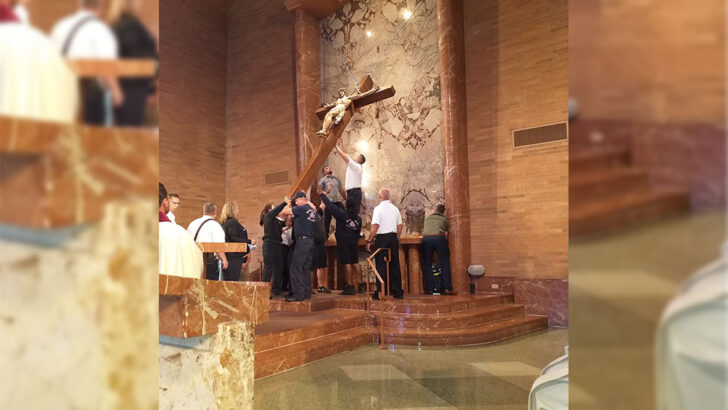I grew up listening to Frankie Byrne. She was the star of the sponsored programme hosted by Jacobs on RTÉ Radio and had the title of Ireland’s agony aunt. The problems she was dealing with “might not be yours today”, she insisted — “but they could be some day”. That’s how I feel about the closure of a church; it’s not our issue today, but how far off is it?
Last month I attended the final Mass at St Bernadette Church in Chicagoland’s Evergreen Park. The event was well-flagged in advance, so it attracted an overflow congregation, all presided over by Fr Benedykt, their Polish-born but Chicago-ordained pastor.
Parting
This Mass, like most American celebrations, featured the full participation of the faithful — singing, reading and praying. I contributed a little to the homily, adding an Irish perspective for a congregation many of whom had Irish roots. The pastor spoke powerfully of the primacy of faith on this Sunday at which the Gospel of the raising of Jairus’ daughter was read: new life in the midst of death.
After Communion came the most poignant words. Lay parishioners gave their parting reflections, revealing both heartbreak and resignation. Then began the ceremony of what was called ‘Relegation’ (as opposed to deconsecration, its equivalent). The pastor prayed in thanksgiving at seven significant stations in the church: the baptismal font, the Holy Oils’ receptacle, confessional, shrine of St Joseph, then at Our Lady’s image, the ambo and finally the altar. Once that prayer was over, the liturgy took on a Holy Thursday feel, as the altar was stripped, the candles quenched, the portable furniture removed.
Goodbyes
As Pastor Benedykt is chaplain to Evergreen Park Fire Dept, he thought it wise to involve them in what happened next. As the congregation watched with reverence, a gurney was brought to the altar and the tabernacle placed on it, clothed in white sheets as might an ailing patient be. Once this was wheeled out, attention shifted to the fifteen-foot high crucifix dominating the altar, which was then removed and carried shoulder-high from the church to a waiting fire-truck. Then came the most poignant ceremony of all, as the whole congregation came forward as for Communion, but this time to each kiss the altar and say ‘goodbye’ to it, and thus to their church.
Outside a procession of cars formed up and, led by the crucifix and tabernacle, all drove along the blocked-off streets to their new parish church. Entering there, each received a long-stemmed white rose for welcome, then all gasped as the tabernacle was enthroned, and the large crucifix carried through the church to its new home.
How long was Mass, you might ask? It began at the customary time of 10.30 am and had its final hymn about 2.30 pm. That’s how long it took to close a parish church in Chicagoland on a June Sunday in 2024. How long will it take to wipe away the tears and heal the broken hearts of those who attended? Only God knows.
*
Words at the closure of a church…
“Most rural parishes in Ireland have a Mass rock or a site where Mass was celebrated in Penal Times. What these places have in common is that they have no walls and no roof, just a holy space for holy people. That experience taught Irish people that buildings don’t matter, they can be taken from us when the powers-that-be decide. Buildings don’t last, only faith does. We have not here a lasting city; at the end, we leave every dwelling behind. Faith sustains us on the journey of life and into new life.”
*
A bleak winter’s evening
l One Mass-rock celebration that I experienced came to mind recently. I was in Uibh Laoire Parish, near Macroom, when a report on abuses on Church-run reformatories came out. Parishioners felt anger, but also sadness that locals had been abandoned to such places. A Mass of Atonement followed at our Mass rock, on a bleak winter’s evening, followed by a procession to the church, in rain and wind, for solemn prayers. My deepest memory was of candles lit for the Mass and carried back to the church, in the rain, never going out — as hope never does, for those who believe.


 The taking down of the altar cross at the end of the last Mass in St Bernadette Church, Evergreen Park, Illinois, USA.
The taking down of the altar cross at the end of the last Mass in St Bernadette Church, Evergreen Park, Illinois, USA. 